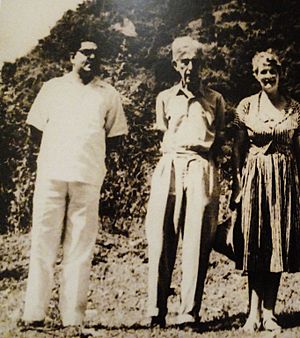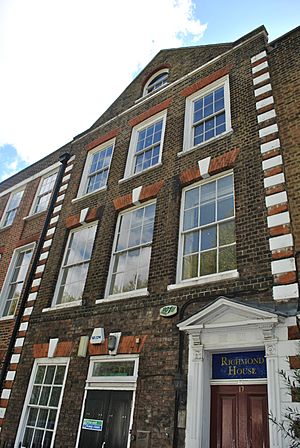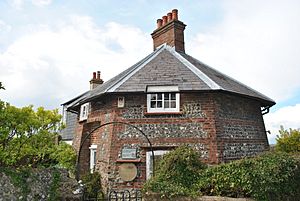Leonard Woolf facts for kids
Quick facts for kids
Leonard Woolf
|
|
|---|---|
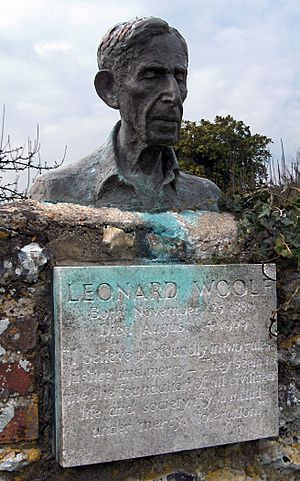
Bust of Leonard Woolf at Monk's House
|
|
| Born |
Leonard Sidney Woolf
25 November 1880 London, England
|
| Died | 14 August 1969 (aged 88) Rodmell, England
|
| Nationality | British |
| Education | Trinity College, Cambridge |
| Occupation | Political theorist, author, publisher and civil servant |
| Spouse(s) | |
| Partner(s) | Trekkie Parsons |
| Relatives | Bella Sidney Woolf (sister) |
Leonard Sidney Woolf (born November 25, 1880 – died August 14, 1969) was a British writer, publisher, and government worker. He was also a political thinker. He is well known for being married to the famous author Virginia Woolf.
Leonard Woolf was a member of the Labour Party and the Fabian Society. He was very active in publishing his own books and his wife's novels. He wrote many books himself, including nineteen different works and six autobiographies. Leonard and Virginia Woolf did not have any children.
Contents
Leonard Woolf's Early Life and Education
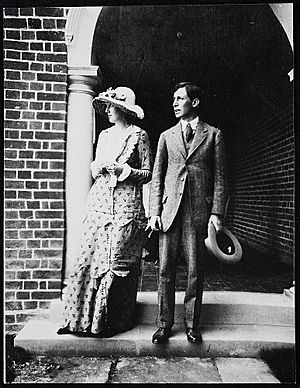
Leonard Woolf was born in London in 1880. He was the third of ten children. His father, Solomon Rees Sidney Woolf, was a barrister (a type of lawyer). His family was Jewish.
After his father passed away in 1892, Leonard went to a boarding school. From 1894 to 1899, he attended St Paul's School. In 1899, he won a scholarship to Trinity College, Cambridge. At Cambridge, he joined a special group called the Cambridge Apostles. Other famous members included John Maynard Keynes and E. M. Forster.
Leonard earned his first degree in 1902. He stayed at Cambridge for another year to prepare for government service exams.
In October 1904, Woolf moved to Ceylon. This country is known today as Sri Lanka. He worked there as a government official. He served in different areas like Jaffna and Kandy. By 1908, he was an assistant government agent. He managed the District of Hambantota.
Woolf returned to England in May 1911 for a break. He decided not to go back to Ceylon. In early 1912, he left his government job. That same year, he married Virginia Stephen.
Leonard and Virginia Woolf lived in Richmond, London, starting in October 1914. In March 1915, they moved to Hogarth House nearby.
In 1919, the Woolfs bought a house called the Round House. Later that year, they found Monk's House in Rodmell. They loved its orchard and garden. Virginia bought Monk's House and sold the Round House.
Leonard and Virginia Woolf became important members of the Bloomsbury Group. This was a group of writers, artists, and thinkers. Many former members of the Cambridge Apostles were also in this group.
In December 1917, Woolf helped start the 1917 Club. This club met in Gerrard Street, London.
Leonard Woolf's Career as a Writer and Publisher
After he got married, Leonard Woolf started writing. His first novel was The Village in the Jungle (1913). This book was based on his time in Ceylon. He then wrote many more books over the years.
During the First World War, in 1916, Leonard was not allowed to join the military. This was because of his health. So, he focused on politics and social issues. He joined the Labour Party and the Fabian Society. He also wrote regularly for a newspaper called the New Statesman. In 1916, he wrote a book called International Government. In it, he suggested creating a global group to help keep peace in the world.
Leonard's wife, Virginia, struggled with her mental health. He spent a lot of time taking care of her. He also dealt with depression himself. In 1917, the Woolfs bought a small printing press. They used it to start the Hogarth Press. Their first project was a small book they printed and bound themselves.
Within ten years, Hogarth Press became a large publishing company. They published Virginia's novels and Leonard's writings. They also published famous works like the first edition of T. S. Eliot's The Waste Land. Leonard continued to lead the Press until he passed away. Virginia died in 1941 after a long struggle with mental illness. Later, Leonard fell in love with an artist named Trekkie Parsons.
Leonard Woolf also worked as an editor for several magazines. He edited the International Review in 1919. He also edited parts of the Contemporary Review from 1920 to 1922. He was the literary editor for The Nation and Athenaeum from 1923 to 1930. He also helped start and edit The Political Quarterly from 1931 to 1959. For some time, he was a secretary for the Labour Party's groups that advised on international and colonial matters.
In 1960, Woolf visited Ceylon again. He was surprised by how warmly he was welcomed. People still remembered him there. In 1964, he received an honorary degree from the University of Sussex. In 1965, he became a Fellow of the Royal Society of Literature. He was offered a special honor in 1966, but he politely turned it down.
Leonard Woolf's Family
Leonard Woolf had nine brothers and sisters. His sister, Bella Woolf, was also a writer.
His brother, Cecil Nathan Sidney Woolf, wrote a book of poems in 1918. Cecil was killed in World War I in 1917. Cecil also wrote a book about medieval political thought. He worked on this book with his brother Philip. Philip and Cecil also translated a book called On Love.
Leonard Woolf's Later Years and Death
Leonard Woolf passed away on August 14, 1969, from a stroke. His body was cremated. His ashes were buried next to his wife's. They rest under an elm tree in his beloved garden at Monk's House in Rodmell, Sussex. The tree later fell down. Now, a bronze bust marks where Woolf's remains are.
His important papers are kept at the University of Sussex.
Leonard Woolf's Published Works
- The Village in the Jungle – 1913
- The Wise Virgins – 1914
- International Government – 1916
- The Future of Constantinople – 1917
- The Framework of a Lasting Peace - 1917
- Cooperation and the Future of Industry – 1918
- Economic Imperialism – 1920
- Empire and Commerce in Africa – 1920
- Socialism and Co-operation – 1921
- International co-operative trade – 1922
- Fear and Politics – 1925
- Essays on Literature, History, Politics – 1927
- Hunting the Highbrow – 1927
- Imperialism and Civilization – 1928
- After the Deluge (Principia Politica), 3 vols. – 1931, 1939, 1953
- Quack! Quack! – 1935
- Barbarians at the Gate – 1939
- The War for Peace – 1940
- A Calendar of Consolation – selected by Leonard Woolf, 1967
Leonard Woolf's Autobiographies
- Woolf, Leonard (1960). Sowing: An Autobiography of the Years 1880–1904. London: Hogarth Press. OCLC 185524636. https://archive.org/details/sowingautobiogra0000wool.
- Woolf, Leonard (1961). Growing: An Autobiography of the Years 1904–1911 (1st American ed.). New York: Harcourt, Brace & World. OCLC 494500.
- Woolf, Leonard (1963). Diaries in Ceylon, 1908–1911, and Stories from the East: Records of a Colonial Administrator. London: Hogarth Press. OCLC 30240642.
- Woolf, Leonard (1975). Beginning Again: An Autobiography of the Years 1911 to 1918. Harcourt Brace Jovanovich. ISBN 978-0-15-611680-0. https://books.google.com/books?id=UNsPAQAAMAAJ.
- Woolf, Leonard (1967). Downhill All the Way: An Autobiography of the Years 1919–1939 (1st American ed.). New York: Harcourt, Brace & World. OCLC 1065888. https://archive.org/details/downhillallway00wool.
- Woolf, Leonard (1969). The Journey Not the Arrival Matters: An Autobiography of the Years 1939–1969. London: Hogarth Press. ISBN 978-0-7012-0326-9. OCLC 186031338. https://archive.org/details/journeynotarriva0000wool_n4v5.
Books About Leonard Woolf
- De Silva, Prabhath: Leonard Woolf as a Judge in Ceylon: A British Civil Servant as a Judge in the Hambantota District of Colonial Sri Lanka (1908–1911). Neptune Publications (Pvt) Ltd, Battaramulla, Sri Lanka (2nd edition 2016). ISBN: 978-955-0028-69-6
- Coates, Irene (2002). Who's Afraid of Leonard Woolf? A Case for the Sanity of Virginia Woolf. New York: Soho Press. ISBN 1-56947-294-7.
- Glendinning, Victoria (2006). Leonard Woolf: A biography. New York: Free Press. ISBN 978-0-7432-4653-8. OCLC 71779088. https://archive.org/details/leonardwoolfbiog00glen.
- Edited excerpt of book available at
- Review of book with details about Leonard Woolf available at
- Leventhal, Fred & Stansky, Peter (2019). Leonard Woolf: Bloomsbury Socialist. Oxford University Press. doi:10.1093/oso/9780198814146.001.0001. ISBN 978-0-19-881414-6.
See also
 In Spanish: Leonard Woolf para niños
In Spanish: Leonard Woolf para niños
- Trekkie Parsons
- Woolf, Leonard; Ritchie, Trekkie (2002). Adamson, Judith. ed. Love letters. London: Pimlico. ISBN 978-0-7126-6473-8. OCLC 49551724.
 | Kyle Baker |
 | Joseph Yoakum |
 | Laura Wheeler Waring |
 | Henry Ossawa Tanner |


